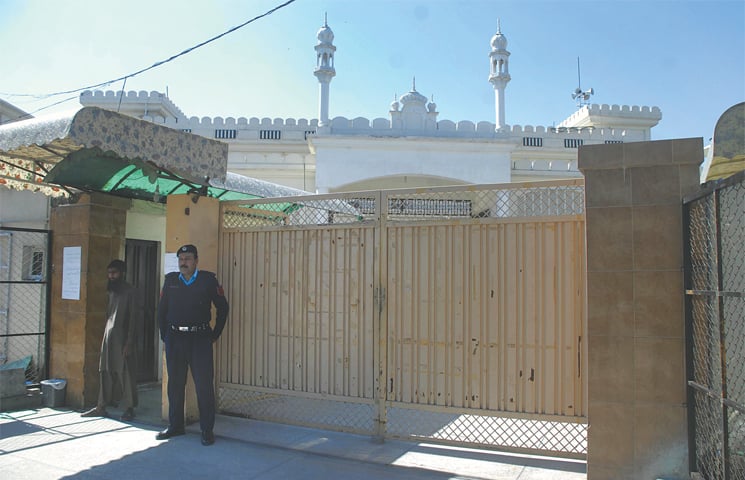ISLAMABAD: Law enforcement agencies on Wednesday intensified the ongoing crackdown on Jaish-e-Mohammad (JeM), Jamaatud Dawah (JuD), Falah-i-Insaniat Foundation (FIF) and other banned outfits, with arrest of more than 100 activists and takeover of nearly 200 seminaries besides hundreds of other facilities and assets associated with them across the country.
The ongoing operation against the proscribed organisations would continue till “achievement of objectives” under the National Action Plan (NAP) of 2014, Minister of State for Interior Shehryar Afridi declared in a tweet, adding that efforts were being made to accelerate progress on NAP.
The scope of NAP was extended a day after the ministry of interior had issued a formal notification to ban the JuD and the FIF as well while 44 activists of JeM and other outlawed groups, including the son and brother of JeM chief Masood Azhar, had already been taken into custody.

In the fresh crackdown, the Punjab government seized control of 160 seminaries, 32 schools, two colleges, four hospitals, 178 ambulances and 153 dispensaries associated with banned organisations, while the Sindh government took over control of 56 facilities being run by the JuD and FIF in Karachi and other districts of the province. Similar actions were taken in Peshawar and Lower Dir districts of Khyber Pakhtunkhwa as well as Quetta and other areas of Balochistan. Raids were also conducted in twin cities of Islamabad and Rawalpindi where more than a dozen holdings of the proscribed organisations were sealed and four to five people were picked up from each establishment in the early hours of Wednesday morning.
Most of the facilities were later handed over to the Auqaf department, health and education authorities. At many mosques, prayer leaders were replaced.
Punjab
In Punjab alone, the provincial authorities took over control of 529 properties of the banned outfits and arrested more than 100 of their activists. Most of the assets belonged to JuD and JeM.
A senior official told Dawn that the law enforcement agencies sealed a seminary of JeM and 46 properties of the JuD in Faisalabad. During the raids, they also arrested 22 suspects of the banned outfits. He said the teams of Punjab police formed for the purpose acted individually besides assisting the personnel of other sensitive agencies in various parts of the province. In Jhang, five people having links with the banned outfits were arrested under NAP and shifted to the district jail. A day ago, seminaries and other properties belonging to the JeM and FIF in Chakwal and Attock districts were confiscated by the law enforcement agencies.
Sindh
In separate raids conducted a day after the federal government imposed a ban on JuD and FIF, the law enforcement agencies in Sindh seized the control of 56 facilities, including schools, hospitals and madressahs, which were previously run by the two organisations.
In all, 31 schools, 16 madressahs and nine hospitals associated with the banned groups were seized across the province. Of them, 10 schools, nine seminaries and five hospitals were situated in Karachi division, three schools and a hospital in Hyderabad district, two schools and a seminary in Matiari, a school in Jamshoro, three schools and a hospital in Mirpurkhas, four schools in Sanghar, a school in Tando Allahyar, three schools and a madressah in Badin, a school, two hospitals and a seminary in Tharparkar, a madressah in Naushahro Feroze, two schools and three madressahs were situated in Benazirabad and one school was functioning in Kambar-Shahdadkot district.
The provincial authorities said the staff of the institutions would be allowed to serve only after due clearance and scrutiny as per standards and procedures of the government. The Sindh government constituted committees at provincial, divisional (in case of Karachi) and district levels to run the facilities “in best interest of public”.
Khyber Pakhtunkhwa
A seminary associated with the banned JeM in Peshawar and two others in Jandol subdivision of Lower Dir district were sealed by the law enforcement agencies before handing over their control to the districts administration. However, there were no reports of arrests from Khyber Pakhtunkhwa.
Balochistan
Law enforcement agencies sealed the offices of both JuD and FIF and seized all their assets in Quetta. JuD was running four schools and seminaries in the city. “We have taken all schools, seminaries, a dispensary and other assets in government custody,” said Quetta Deputy Commissioner retired Major Tahir Zafar Abbasi. Four ambulances parked on the premises of JuD offices were impounded and handed over to the civil hospital, he said.
Sources said the two recently banned organizations also had seminaries and other facilities in Pishin, Chaman and Hub. “Action against all these organizations is under way in the entire province,” said officials in home department.
JuD reaction
Spokesman for the JuD Yahya Mujahid has termed the government action ‘injustice’. He said it was unfair to confiscate ambulances and dispensaries by the Auqaf and health departments of the respective districts. The JuD and FIF had put in untiring efforts to establish these welfare institutions. “There is no case or complaint against the FIF or its welfare activities anywhere in the country,” he said.
The JuD spokesman claimed, “We have even provided a large number of water schemes in Tharparkar where local population was largely Hindus.”
He said that the group would fight for its rights in the courts of law.
Published in Dawn, March 7th, 2019












































